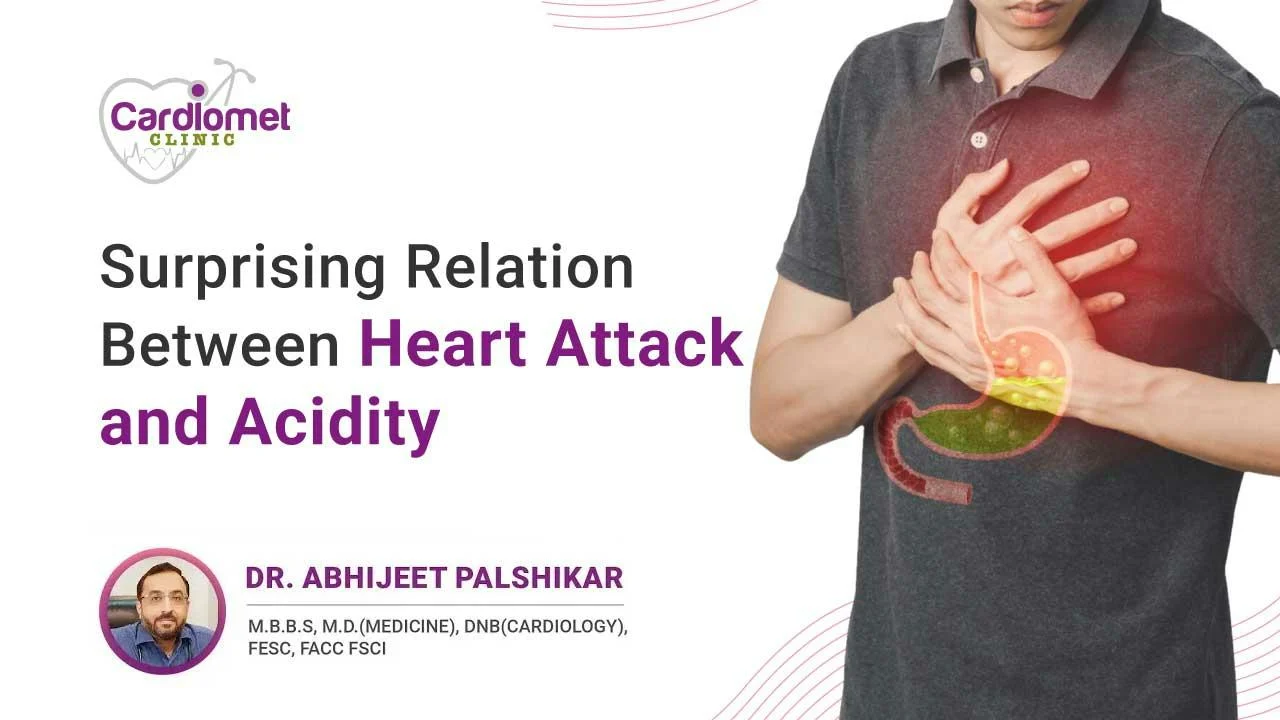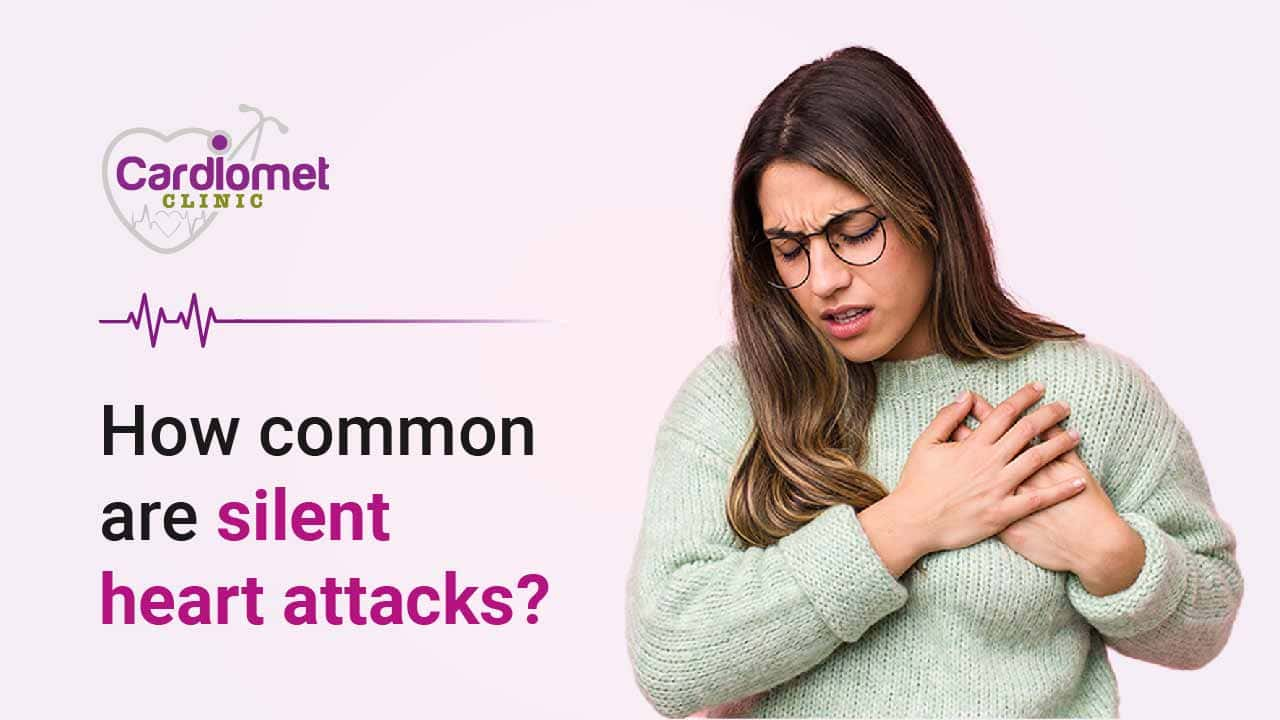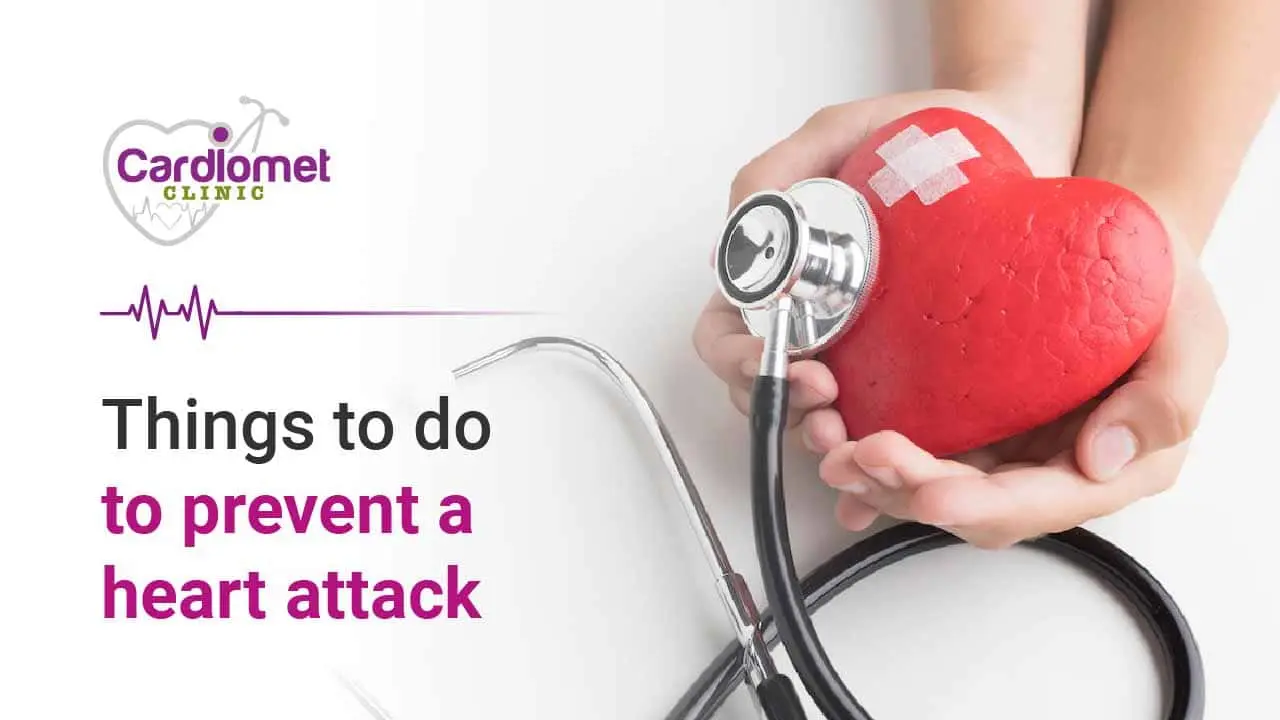Surprising Relation Between Heart Attack and Acidity
Are you experiencing chest pain and unsure if it's a heart attack or just heartburn? It can be challenging to differentiate between the two, as some symptoms may overlap.

In this article, we will define heartburn and heart attack, discuss their similarities and differences, and emphasize the importance of seeking medical attention immediately if you experience any of the symptoms of these conditions. Knowing the signs can be crucial in receiving timely treatment and potentially saving your life.

Heartburn i.e. Acidity vs Heart attack
Heartburn, also known as acid reflux or acidity, is a burning sensation in the chest caused by stomach acid flowing back into the esophagus. This occurs when the lower esophageal sphincter (LES) does not close properly, allowing acid to escape from the stomach. Heartburn is generally not life-threatening and can often be managed with lifestyle changes and over-the-counter medications.

A heart attack, on the other hand, is a serious medical emergency where blood flow to a part of the heart is blocked, usually by a blood clot. Without timely intervention, this can lead to permanent damage or death of the heart muscle cells. Heart attacks are typically caused by coronary artery disease, which is the buildup of plaque in the arteries that supply blood to the heart.
While both heartburn and heart attacks can cause chest pain, there are some notable differences between the two conditions. Heartburn pain tends to worsen after eating or lying down and may be accompanied by a bitter taste in the mouth or regurgitation of food or acid. In contrast, heart attack pain may spread to the neck, jaw, arms, or back and is often accompanied by shortness of breath, nausea, vomiting, lightheadedness, sweating, or fainting.
Despite these differences, it can still be challenging to distinguish between heartburn and a heart attack, especially since heart attack symptoms can vary among individuals. Therefore, if you experience any of the symptoms mentioned above, it is crucial to seek medical attention immediately. Early intervention can significantly improve outcomes for heart attack patients and prevent more severe complications. In cases of heartburn, consulting a physician can help rule out more severe conditions and provide guidance on appropriate treatment options.
Symptoms of Heartburn
Heartburn can manifest in various ways, and its symptoms may differ from person to person. Common symptoms associated with heartburn include:
- Burning sensation in the chest: This is the most typical symptom of heartburn, often described as a burning pain or discomfort behind the breastbone. The sensation may radiate upwards towards the throat.
- Pain that may worsen after eating or lying down: Heartburn symptoms tend to intensify after consuming a large meal or specific trigger foods, such as spicy or fatty dishes. Lying down or bending over can also exacerbate the pain due to increased pressure on the abdomen.
- Regurgitation of food or acid into the mouth: This occurs when stomach contents flow back up into the esophagus and sometimes reach the mouth, resulting in a sour or bitter taste.
- Bitter taste in the mouth: Along with regurgitation, a persistent bitter taste in the mouth can be an indicator of heartburn, caused by the presence of stomach acid.
- Difficulty swallowing: In some cases, Heartburn may cause inflammation or irritation in the esophagus, leading to difficulty or discomfort when swallowing. This symptom, also known as Dysphagia, should be discussed with a healthcare professional, as it may indicate a more severe issue.
Symptoms of Heart Attack
Recognizing the symptoms of a heart attack is crucial, as timely medical intervention can save lives and minimize damage to the heart muscle. Common Symptoms Associated With a Heart Attack Include:
- Chest pain or discomfort: Often described as a squeezing, fullness, or pressure in the center of the chest, heart attack pain can last for several minutes or come and go. It is important to note that chest pain intensity may vary among individuals, and some heart attacks occur without any chest pain at all.
- Pain that may spread to the neck, jaw, arms, or back: Heart attack pain can radiate beyond the chest, commonly affecting the left arm, but it may also extend to the right arm, shoulders, neck, jaw, or back.
- Shortness of breath: Difficulty breathing or a sudden onset of shortness of breath can occur during a heart attack, either with or without chest pain.
- Nausea or vomiting: Some people may experience nausea, vomiting, or indigestion-like symptoms during a heart attack.
- Lightheadedness or dizziness: Feeling lightheaded, dizzy, or experiencing a sudden loss of balance may indicate a heart attack.
- Sweating: Breaking out in a cold sweat without any apparent reason could be a sign of a heart attack.
- Fainting: In some cases, heart attack victims may lose consciousness or faint due to a drop in blood pressure or inadequate blood flow to the brain.

It is essential to seek immediate medical attention if you or someone you know experiences any of these symptoms, as prompt treatment can significantly improve outcomes and potentially save lives.
Diagnosis and Treatment of Heartburn
- Diagnosis: The diagnosis of heartburn is usually made based on the patient's symptoms and medical history. In some cases, a healthcare professional may perform additional tests, such as an endoscopy or pH monitoring, to confirm the diagnosis or rule out other conditions.
- Treatment: Treatment for heartburn typically involves a Combination of Lifestyle changes, medications, and, in Rare Cases, Surgery.
- Lifestyle changes: Avoiding trigger foods, eating smaller meals, not lying down immediately after eating, maintaining a healthy weight, and quitting smoking can help reduce heartburn symptoms.
- Medications: Over-the-counter antacids, H2 blockers, and proton pump inhibitors (PPIs) can help neutralize stomach acid or reduce its production, providing relief from heartburn symptoms.
- Surgery: In severe cases or when conservative treatments fail, surgery may be recommended to repair the LES or create a barrier to prevent acid reflux.
Diagnosis and Treatment of Heart Attack
- Diagnosis: A heart attack is typically diagnosed using an electrocardiogram (EKG) to detect abnormal heart rhythms or damage to the heart muscle. Blood tests to measure cardiac enzymes, which are released during a heart attack, may also be performed.
- Treatment: Treatment for a heart attack aims to restore blood flow to the affected area of the heart muscle as quickly as possible. This may involve medications, surgery, or a combination of both.
- Medications: Various medications can be administered to dissolve blood clots, reduce heart workload, prevent further clot formation, or manage pain and anxiety.
- Surgery: Procedures such as Angioplasty and stenting or coronary artery bypass grafting (CABG) may be performed to re-establish blood flow to the heart muscle.
- Combination therapy: In many cases, a combination of medications and surgical interventions will be used to treat a heart attack, followed by long-term management strategies such as lifestyle changes and cardiac rehabilitation.

While it is essential to seek medical attention if you experience chest pain or discomfort, here are some quick questions to ask yourself that may help differentiate between acidity (heartburn) and a heart attack:
- Did the pain begin or worsen after eating? Heartburn is more likely to be associated with specific foods or large meals, while Heart Attack Symptoms can occur at any time.
- Does the pain change when you change positions? Heartburn pain may lessen when Sitting up or Standing and Worsen When Lying Down or Bending Over, whereas Heart Attack Pain usually remains consistent regardless of body position.
- Is the pain accompanied by a sour or bitter taste in your mouth? This may indicate regurgitation of stomach acid, which is more commonly associated with heartburn.
- Can you pinpoint the pain to a specific area of the chest? Heartburn pain is usually localized behind the breastbone, while heart attack pain may be more diffuse and radiate to other areas like the neck, jaw, arms, or back.
- Are you experiencing shortness of breath, cold sweat, nausea, vomiting, dizziness, or fainting? These symptoms are more commonly associated with heart attacks.
Remember, these questions are not a definitive Diagnostic Tool, and it's Crucial to consult a qualified physician if you have any concerns about your symptoms. Only they can accurately diagnose your condition and provide appropriate treatment.
Why Cardiomet Clinic?
Access all the ultimate hub for advanced cardiac treatment in Pune, led by renowned cardiologist Dr. Palshikar. His unparalleled expertise spans Complex ngioplasties, Angiography, and specialized services. A distinguished National Faculty for the esteemed National Interventional Council and Fellow of the European Society of Cardiology, at Cardiomet Clinic Dr. Abhijeet Palshikar is well-known Cardiologist in pune .

Boasting a remarkable record of 10,000+ cases and 7000+ interventions, he's a trusted authority.
As a distinguished faculty member on global stages, including the 2019 Complex Cardiovascular Therapeutic conference in Japan, and a seasoned live case operator since 2012 for the National Interventional Council, Dr. Abhijeet Palshikar's contributions are unmatched. Elevate your heart health journey at our esteemed Pune heart clinic.




